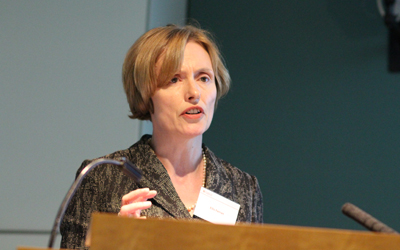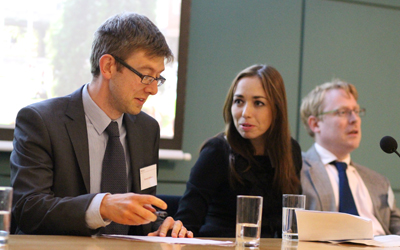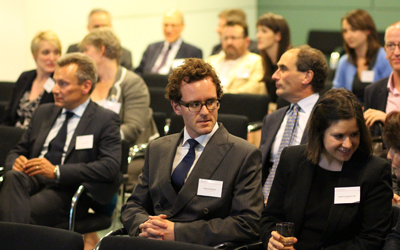The first of a planned series of occasional seminars at which members of the judiciary, legal profession, legal commentators and others have the opportunity to hear about Faculty activities and to discuss matters of mutual interest took place at the offices of Travers Smith on 1 July 2014.
The Faculty in General
 Eilís Ferran, the Chair of the Faculty, outlined recent developments that will help the Faculty to maintain its position as a leading international law school that is at the forefront of legal research and in which connections between research and teaching are highly valued. She highlighted the establishment by the University of four new Lectureships (in Empirical Legal Studies, Law and the Open Society, Intellectual Property, and Tax Law) and also a new Lectureship in Medical Law, Ethics and Policy, generously funded by the Hatton Trust and the WYNG Foundation.
Eilís Ferran, the Chair of the Faculty, outlined recent developments that will help the Faculty to maintain its position as a leading international law school that is at the forefront of legal research and in which connections between research and teaching are highly valued. She highlighted the establishment by the University of four new Lectureships (in Empirical Legal Studies, Law and the Open Society, Intellectual Property, and Tax Law) and also a new Lectureship in Medical Law, Ethics and Policy, generously funded by the Hatton Trust and the WYNG Foundation.
Professor Ferran went on to explain how the Faculty is addressing the funding gap faced by exceptional students with great research potential by raising funds to increase the number of PhD and Masters studentships it is able to offer. She outlined the growing importance of Faculty Centres as pivots for research in different sub-fields and as locations for debates of international and national significance.
Finally, she mentioned new agreements with international partners (Hong Kong University, Melbourne Law School, Monash Law School and Sydney Law School) as examples of ways in which the Faculty furthers the University's mission to contribute to society through the pursuit of education, learning and research at the highest international levels of excellence.
Undergraduate Admissions
Amy Goymour and Richard Williams, the Faculty's Access Officers, gave a presentation on the Law Faculty's admissions and access work. Their talk began by noting that the Faculty had seen a 12% increase in applications, of which roughly a quarter had received an offer, and that 65 of these had received their offer via the 'winter pool' - an intercollegiate clearing system designed to ensure that the very best applicants get into Cambridge, regardless of the college to which they choose to apply. They also noted that, within the cohort of current first year Law students, 67% of the home students were educated in the state sector.
The Access Officers then explained that their primary role is to ensure that the pool of applicants from which the University make offers is as strong as possible, by encouraging the brightest and most motivated students to apply for Law at Cambridge. To this end, they identified the Faculty's access activities as having three core goals:
 The first goal is to encourage bright students to apply to study Law at university, rather than another subject. They spoke of various measures being taken by the Faculty to promote the value of Law as an academic discipline, in order to counter the perception, prevalent in schools and in the media, that aspiring lawyers should study a non-Law subject at university. One such initiative is a new conference for sixth form teachers, to be held in September 2014, designed to provide an insight into studying Law at university.
The first goal is to encourage bright students to apply to study Law at university, rather than another subject. They spoke of various measures being taken by the Faculty to promote the value of Law as an academic discipline, in order to counter the perception, prevalent in schools and in the media, that aspiring lawyers should study a non-Law subject at university. One such initiative is a new conference for sixth form teachers, to be held in September 2014, designed to provide an insight into studying Law at university.
The second access goal is to encourage bright students to apply for Law at Cambridge. To this end, the Faculty holds various events and taster days for prospective applicants, including the three-day residential Sixth Form Law Conference organised by an enthusiastic student committee.
The third access goal is to ensure that bright students apply regardless of their background. The Faculty enthusiastically participates in a wide range of access initiatives to meet this goal and is always attentive to new initiatives that enable us to contract the widest pool of potential law students. We participate in a number of initiatives in conjunction with the Sutton Trust, including an annual summer school and 'Experience Cambridge' events. Sutton Trust initiatives are open to intellectually able students from non-traditional backgrounds. We also participate in initiatives designed to widen participation amongst specific target groups such as the University BAME initiative (which engages with black, Asian and minority ethnic students with high intellectual potential) and its Children in Care initiative. Through all of these activities, and others, we aim to give students who are interested in studying law an insight into the subject and the University, stimulating them to think about social and policy questions that lie underneath legal rules and to think about the law's practical application.
Research Highlights
The seminar provided a glimpse of the innovative work of the members of the Faculty's exceptionally strong academic staff with two short research presentations on Private and Public Law.
Drawing upon his acclaimed book Contract Law Minimalism (CUP, 2013) Jonathan Morgan argued that the paramount value of commercial contract law is choice. Sophisticated commercial actors choose not just the terms of their agreements, but also the system of contract law that will govern their contracts. It is, accordingly, futile to attempt to force on commercial actors values that are irrelevant or inimical to their deals (e.g. moral goodness, or economic fairness). Different considerations will, of course, apply in areas of the law where public policy requires intervention to correct power imbalances - eg. consumer law and employment law. But in the commercial heartland of "general" contract law, the less the law tries to do the better.
The lesson of economic analysis is that it is difficult to come up with general rules that efficiently govern across the range of potential contracts. It is better to leave it to the parties to tailor to their own requirements (and arguably a paucity of "default rules", i.e. minimal contract doctrines, encourages this). In the end, a system of commercial contract law that fails to respect the needs of its "clients" will not be positively chosen by well-informed commercial parties (and their legal advisers), and may exist only as a trap for the inadvertent. An artefact of primarily academic interest, and little practical importance.
Kirsty Hughes outlined some of the groundbreaking analysis in her forthcoming book Dimensions of Privacy: Privacy Theory and Article 8 European Convention on Human Rights (Hart Publishing, 2014) in which she uses privacy theory to critically analyse Article 8 ECHR and vice versa. The book will provide a comprehensive and thematic account of the privacy protection afforded by Article 8 ECHR and bring together for the first time privacy theory and Article 8 ECHR jurisprudence.
Dr Hughes explained that one theme builds on the view first enunciated in her paper A Behavioural Understanding of Privacy and its Implications for Privacy Law (2012) 75 MLR 806, that privacy has a social dimension in two important senses. First, social considerations inform what we mean by privacy: privacy, she argues, is "a multi-faceted concept which derives its meaning in particular situations from the social context and the ways in which people experience and respond to those situations". The other social dimension relates to the implications of protecting privacy: such protection is valuable because privacy "plays a crucial role in facilitating social interaction and that an individual or group experiences privacy when he, she or they successfully employ barriers to obtain or maintain a state of privacy". In this way, social considerations both inform what we should count as "private" in the first place and shape our understanding of why we ought to protect that which is "private".
Discussion
 Lively and wide discussion ensued over drinks. The Faculty looks forward to continuing these conversations with friends and supporters. We are extremely grateful to Travers Smith for supporting the organisation of this seminar and for its generous hosting.
Lively and wide discussion ensued over drinks. The Faculty looks forward to continuing these conversations with friends and supporters. We are extremely grateful to Travers Smith for supporting the organisation of this seminar and for its generous hosting.
A gallery of photographs from the event is available on Flickr.

 Facebook
Facebook  X/Twitter
X/Twitter  Instagram
Instagram  YouTube
YouTube  Flickr
Flickr  LinkedIn
LinkedIn